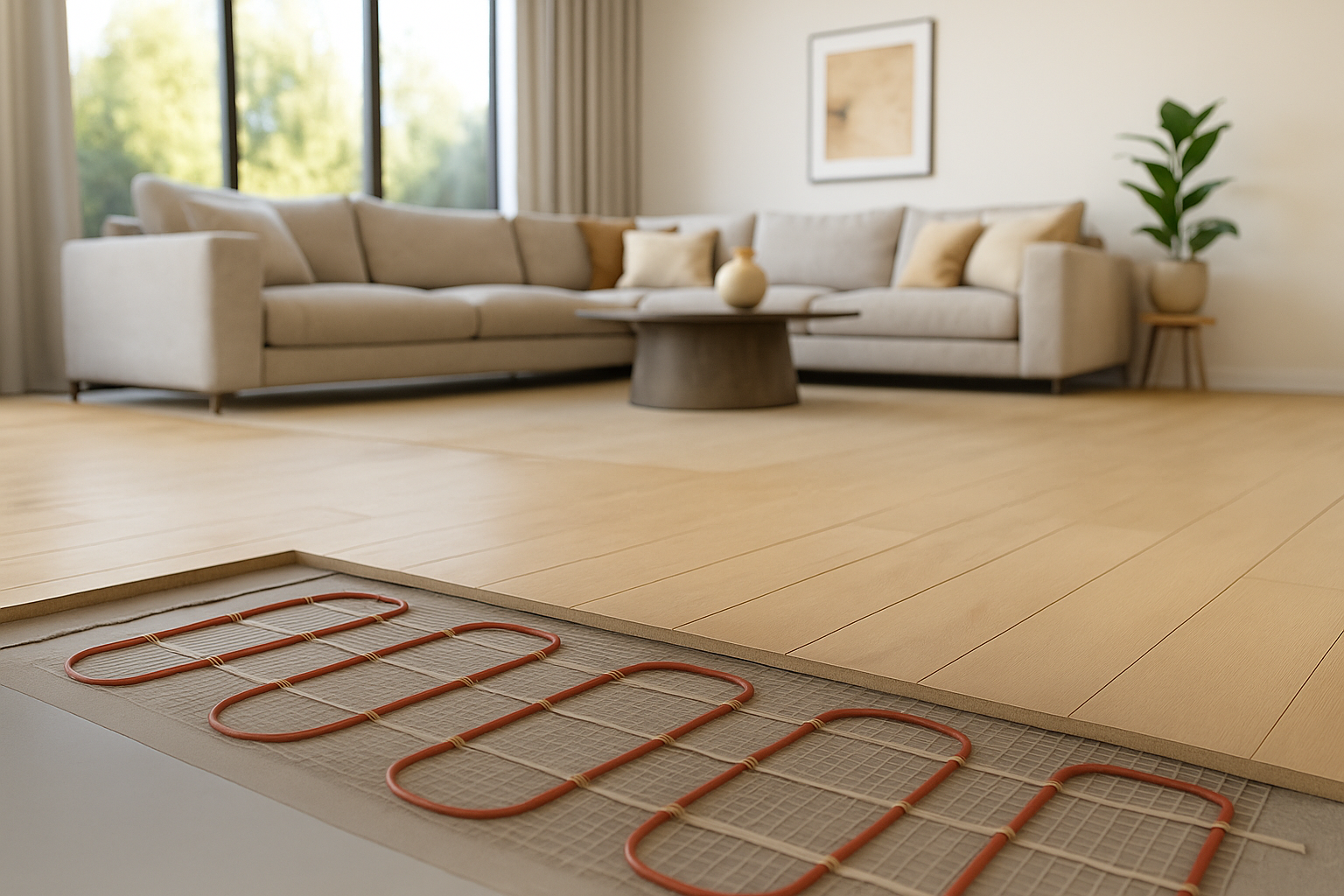When you think about modernizing your home’s comfort and energy efficiency, underfloor heating-also called radiant floor heating-is an elegant and practical choice. Especially across Dallas-Fort Worth, where winters are mild yet chilly mornings make comfort a priority, this system adds warmth, efficiency, and luxury to any home design.
Why Underfloor Heating Makes Sense in Texas
Unlike traditional forced-air systems that push warm air from vents, underfloor heating delivers heat evenly from the floor up. That means no cold spots, no blowing dust, and no temperature swings between rooms.
In many DFW homes-known for open floor plans, tall ceilings, and sleek finishes-this system complements both function and aesthetics. It’s completely hidden, whisper-quiet, and works beautifully with modern flooring materials like tile, stone, and engineered wood.
Key Benefits of Radiant Floor Heating:
Even, consistent warmth throughout the space
Improved indoor air quality with no ducts or allergens
Completely silent and invisible design integration
Compatible with a range of flooring finishes
Adds luxury appeal and resale value to high-end homes
What to Consider Before Installation
Underfloor heating is an investment, and proper planning ensures lasting comfort and performance.
| Consideration | Why It Matters in DFW Homes |
|---|---|
| Flooring Type & Height | Some systems require additional subfloor space or special underlayment-important to account for during remodels. |
| System Type: Electric vs. Hydronic | Electric systems are ideal for single rooms or bathrooms; hydronic systems are better for larger spaces and new builds. |
| Insulation & Climate | While DFW winters are mild, insulation ensures consistent heat and energy efficiency year-round. |
| Control & Zoning | Smart thermostats allow each room to be adjusted separately-perfect for bathrooms, kitchens, or living areas. |
| Cost vs. Long-Term Value | Initial installation is higher than standard heating, but energy savings and added comfort deliver lasting value. |
Cost and ROI Snapshot
Installing radiant floor heating varies by system type and home size, but here’s a helpful overview for DFW homeowners:
| System Type | Average Cost per Sq. Ft. | Best For |
|---|---|---|
| Electric Mat System | $10 – $15 | Small rooms, bathrooms, remodel zones |
| Hydronic (Water-Based) | $13 – $20 | Whole-home installations, new builds |
| Smart Thermostat Integration | $150 – $400 | Zoned temperature control, energy efficiency |
Average full installation cost: $4,000 – $7,000, depending on square footage.
Expected lifespan: Over 25 years with minimal maintenance.
Potential resale value increase: 2-5 % for luxury homes with integrated systems.
While the upfront investment is higher, underfloor heating enhances comfort, energy efficiency, and the long-term desirability of your property-especially important in DFW’s competitive housing market.
Best Flooring & Home Types in DFW for Underfloor Heating
The most successful installations happen when design and function work hand-in-hand. In the DFW area, radiant floor heating pairs perfectly with:
Luxury remodels featuring stone, porcelain, or hardwood finishes
New builds where subfloor adjustments are simple to plan
Primary suites or bathrooms where comfort and indulgence matter most
Open-concept living areas that benefit from even temperature distribution
Homes across Dallas, Fort Worth, Southlake, and Frisco are ideal candidates-particularly when the design goal is a refined, seamless living experience.
Installation Tips for Texas Homes
Because Texas homes are designed for hot summers as much as cool winters, radiant heating should be planned with balance in mind.
Smart installation tips:
Avoid using underfloor heating beneath thick carpets-they trap heat.
For tile and stone floors, include an insulation layer below heating mats for maximum efficiency.
Use programmable thermostats to regulate temperature and save energy when rooms aren’t in use.
Combine radiant heating with your home’s existing HVAC system for year-round comfort.
Always work with designers and contractors experienced in DFW’s climate and building codes.
Energy Efficiency Insights
Radiant floor heating systems can operate 15–20 % more efficiently than traditional forced-air setups because they deliver heat directly to the occupied zone.
| Heating System | Average Energy Loss | Efficiency Rating |
|---|---|---|
| Forced-Air (Ducted) | Up to 30 % | Moderate |
| Baseboard Units | 15 – 20 % | Moderate |
| Radiant Floor (Electric) | < 10 % | High |
| Radiant Floor (Hydronic) | < 5 % | Very High |
For DFW homeowners, that efficiency translates to lower monthly energy bills, especially during the transitional months when you don’t need full-scale HVAC heating.
Design Harmony and Comfort
Underfloor heating isn’t just functional-it’s a design upgrade. By removing bulky vents, radiators, or baseboards, designers have more creative freedom for clean lines, open layouts, and minimalistic interiors.
In spaces designed by The Nielsen Collection, this system often pairs beautifully with:
Spa-style primary bathrooms with large-format tiles
Transitional kitchens blending stone and hardwood
Whole-home renovations that emphasize balance, comfort, and understated luxury
The result? A home that feels as good as it looks—warm, welcoming, and crafted for the Texas lifestyle.
Final Thoughts
For homeowners in the Dallas–Fort Worth area, underfloor heating brings an unmatched combination of luxury, efficiency, and comfort. Whether you’re renovating a single room or building a custom home, radiant floor heating offers modern technology with timeless appeal.
While installation costs are higher upfront, the long-term benefits-better comfort, cleaner air, increased home value, and elegant design freedom-make it a worthwhile investment for discerning homeowners.
When thoughtfully integrated by experts who understand both the climate and design standards of North Texas, radiant heating becomes more than just a feature-it becomes a signature of refined living.







